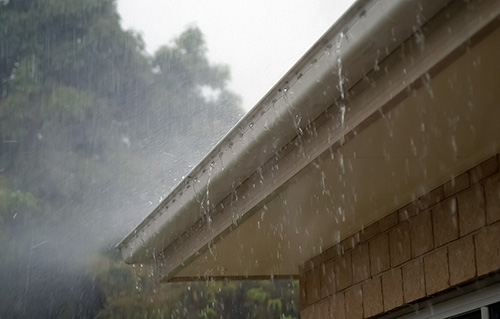The purpose of gutters is to catch rain and move it away from a building’s foundation. When water leaks into the foundation, it can affect your basement and the building itself. Over time, leaks can leave moisture that causes mold and rotting. Many homeowners use their gutter systems to catch rainwater that they can use to water their gardens.
Gutters commonly overflow for one or more reasons: too much rain, too few gutters and downspouts, and clogged gutters and/or downspouts.
Too Much Rainwater
Sometimes an abundance of rain can send leaves and debris into your gutters, clogging them. Over time, gutters can sag from the weight of too much rainwater. This is the most common reason gutters overflow.
While you cannot control how much rainwater a storm may bring, a good way to prevent gutters from overflowing is by investing in high-quality gutters. This is especially true in cities that receive high amounts of rainfall. You can also install splash guards if your home has a steep roof, so that water will not overrun during storms.
Not Enough Gutters and Downspouts
 If there are not enough gutters on the sides of your home, the rainwater may overflow. This can overwork your gutters and downspouts, damaging them. Damaged gutters and downspouts can start leaking. This may damage your home because the rainwater can seep into the foundation.
If there are not enough gutters on the sides of your home, the rainwater may overflow. This can overwork your gutters and downspouts, damaging them. Damaged gutters and downspouts can start leaking. This may damage your home because the rainwater can seep into the foundation.
You should install enough gutters on the sides of your home or business to handle the type of rain in your area. This will help distribute the rainwater evenly, so it doesn’t overflow or damage the gutters. Adding downspouts will also improve your gutter system.
In areas that receive high amounts of rain, another solution could be to install larger gutters and downspouts.
Clogged Gutters and Downspouts
When leaves and other debris sit in your gutter system, it affects the way rainwater drains from the roof to the ground. Debris traps the water, causing the gutters to overflow. This can become a hazard, because the water may seep into the walls and ceilings.
To solve this issue, you can have mesh screens installed over your gutters that can prevent leaves, dirt, and other debris from falling into them. Regularly cleaning out your gutters and downspouts before storm season also helps prevent damage to the system and your house. You should clean your gutters at least twice a year for best results. However, if you have trees nearby or especially rainy weather conditions, you might need to clean them more frequently.
You can use a leaf blower to push debris out of your gutters with air, or you can use the old-fashioned method and clean them out by hand. If you want to clean your gutters manually, it’s important to do it when the roof is dry.
Able Roof knows how important your gutter systems are to the life of your roof and that a better system has fewer maintenance issues. Call us if you want to learn more about available gutter systems; we offer free estimates and can often install a gutter system in less than a day.








